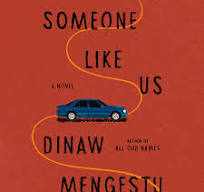“Someone Like Us”
Reviewed by Steven G. Kellman
With the publication of his plangent first novel, The Beautiful Things That Heaven Bears (2007), Dinaw Mengestu became the most prominent author of the Ethiopian diaspora. The story of an amiable immigrant who attempts to remake his life running a grocery store in Washington, D.C., it is redolent of the desolation of dislocation.

Unlike Mengestu, a native of Addis Ababa, Mamush, the narrator of his fifth novel, Someone Like Us, is American-born and grew up in Chicago and the Washington suburbs. Though the child of Ethiopian immigrants, he never got around to learning Amharic. Like his biological father Samuel, Mamush is “at home nowhere in the world.” Yet he lives in Paris, where, as a freelance journalist, he tries to cobble together a living writing what someone characterizes as “stories for people who want to feel bad about immigrants.” The novel begins with Mamush’s decision to leave his wife and young son and fly to the United States. His ostensible purpose is to visit his mother in Virginia, but he ends up taking a plane to Chicago, where, fortified and flustered by drugs and alcohol, he confronts painful childhood memories and learns of his own origins. Mengestu’s novel is the record of three days of a revelatory nervous breakdown.
“We are always in more than one place at a time,” says Samuel, a refugee from violence in Ethiopia vulnerable to racial brutality in America. A taxi driver who is constantly in motion, Samuel dreams of creating a network of cabbies who can team up to transport their passengers long distances across the United States. The atlas stored in the glove compartment of his car tells “the story of his life in America.” It is a story of flux and failure, ending in the enigma of suicide.
To convey the reality of being always in more than one place at a time, Someone Like Us embodies the experience of simultaneity and ubiquity through frequent jumps in time and space and into and out of the fervid imagination of Mamush. It is sometimes as confusing for the reader as it is for Mamush, uncertain of where his home is and who he is. “You’re like a donut,” someone tells him. “There’s a hole in the middle, where something solid should be.” Mamush is, as the title suggests, “someone like us,” but the novel challenges assumptions about just who he is and who we are. Asked to recall details of his childhood, Mamush’s mother tells him: “You never complained. You were happy wherever you went.” The addled grownup narrator has lost his ability to achieve serenity in mobility.
An anchor amid the instability is Hannah, Mamush’s wife, who tries to guide him by texting him from Paris throughout his anguished journey. She is the patient Penelope awaiting the frantic traveler’s return home. A professional photographer, Hannah attaches photos – a tree, a street, their young son – to the messages she sends, endowing Mengestu’s book with the texture of a photo-novel blending text and image.
When he was eighteen, Mamush declared his ambition to write a book called Lucy’s Children. It “would cover the history of human migration from Ethiopia to the present moment, a collection of dozens, perhaps even hundreds of individual stories of people leaving their homes and creating new ones not just in America but all over the world.” A broken man, like his father Samuel, Mamush is incapable of writing that book, although Mengestu could surely do it. For the moment, he offers this doleful, resonant story of shattered, displaced lives.
—————————————————————————————————————–S
“Someone Like Us” by Dinaw Mengestu; Knopff, 2024; $28
